Global microscope on the microfinance business environment 2012
Global microscope on the microfinance business environment 2012
Global microscope on the microfinance business environment 2012
You also want an ePaper? Increase the reach of your titles
YUMPU automatically turns print PDFs into web optimized ePapers that Google loves.
This article was<br />
prepared by Robert<br />
Vogel (Independent<br />
c<strong>on</strong>sultant) and<br />
c<strong>on</strong>tributi<strong>on</strong>s from MIF,<br />
CAF, and IFC.<br />
1. Individual fi nancial<br />
instituti<strong>on</strong>s even in<br />
microfi nance tend to be most<br />
successful when <strong>the</strong>y specialise<br />
in particular products and<br />
market niches.<br />
2. While insurance is also often<br />
menti<strong>on</strong>ed as ano<strong>the</strong>r<br />
important product for fi nancial<br />
inclusi<strong>on</strong>, MFIs can <strong>on</strong>ly be<br />
expected to be sellers of<br />
insurance underwritten by<br />
o<strong>the</strong>rs because <strong>the</strong>ir clientele is<br />
typically not adequately<br />
diversifi ed to permit effective<br />
pooling of risks.<br />
20<br />
In focus<br />
Advances in Resp<strong>on</strong>sible<br />
Finance<br />
Interest in resp<strong>on</strong>sible fi nance has grown markedly<br />
in recent years, especially since <strong>the</strong> beginning of<br />
<strong>the</strong> worldwide fi nancial crisis in 2008. In fact, overindebtedness<br />
and fi nancial literacy, in particular,<br />
were identifi ed as <strong>the</strong> most pressing issues in<br />
resp<strong>on</strong>sible fi nance, according to <strong>the</strong> Microscope<br />
<strong>2012</strong> survey. Since microfi nance instituti<strong>on</strong>s (MFIs)<br />
cannot be expected individually to take <strong>on</strong> <strong>the</strong> full<br />
burden of fi nancial inclusi<strong>on</strong> and offer all types of<br />
fi nancial products to all types of potential<br />
c<strong>on</strong>sumers, 1 fi nancial inclusi<strong>on</strong> is essentially<br />
determined by <strong>the</strong> regulators and policymakers<br />
shaping <strong>the</strong> country’s overall fi nancial sector.<br />
However, MFIs and regulators are <strong>on</strong>ly a few of <strong>the</strong><br />
expanding interested parties. Indeed, <strong>the</strong> number<br />
of resp<strong>on</strong>sible fi nance stakeholders has multiplied<br />
to include not <strong>on</strong>ly regulators and MFIs, but also a<br />
wide variety of entities including n<strong>on</strong>-profi t<br />
organisati<strong>on</strong>s, banks, d<strong>on</strong>ors, investors, and rating<br />
agencies, am<strong>on</strong>g o<strong>the</strong>rs.<br />
Regulators have l<strong>on</strong>g recognised <strong>the</strong> importance<br />
of client protecti<strong>on</strong> and have recently made<br />
important strides towards experience-based<br />
standards and guidelines. For example, <strong>the</strong><br />
Associati<strong>on</strong> of Supervisors of Banks of <strong>the</strong> Americas<br />
(ASBA) recently completed a review of resp<strong>on</strong>sible<br />
client protecti<strong>on</strong> in <strong>the</strong> Americas, c<strong>on</strong>sidering in<br />
particular who has <strong>the</strong> legal mandate and who is in<br />
fact enforcing it. At a global level, <strong>the</strong> Alliance for<br />
Financial Inclusi<strong>on</strong> (AFI) is a network of fi nancial<br />
policymakers from developing and emerging<br />
ec<strong>on</strong>omies c<strong>on</strong>cerned, am<strong>on</strong>g o<strong>the</strong>r issues, with<br />
© The Ec<strong>on</strong>omist Intelligence Unit Limited <strong>2012</strong><br />
<str<strong>on</strong>g>Global</str<strong>on</strong>g> <str<strong>on</strong>g>microscope</str<strong>on</strong>g> <strong>on</strong> <strong>the</strong> microfi nance <strong>business</strong> envir<strong>on</strong>ment <strong>2012</strong><br />
<strong>the</strong> regulatory aspects of resp<strong>on</strong>sible fi nance. Such<br />
initiatives show <strong>the</strong> importance of going bey<strong>on</strong>d<br />
internati<strong>on</strong>al standards and guidelines to focus <strong>on</strong><br />
<strong>the</strong> practical organisati<strong>on</strong>al issues of how to put<br />
resp<strong>on</strong>sible fi nance <strong>on</strong> each country’s agenda; that<br />
is, while investors and d<strong>on</strong>ors have a role,<br />
resp<strong>on</strong>sible fi nance needs to become a nati<strong>on</strong>al<br />
agenda item.<br />
Many important initiatives to develop<br />
resp<strong>on</strong>sible fi nance and fi nancial inclusi<strong>on</strong> have<br />
taken place. In particular, <strong>the</strong> Smart Campaign to<br />
promote resp<strong>on</strong>sible fi nance, initiated in 2008-09,<br />
has received major support for its pilot work to<br />
promote to seven principles: preventi<strong>on</strong> of overindebtedness<br />
(for example, cash fl ows and credit<br />
bureaus); transparency (for example, interest rates<br />
and o<strong>the</strong>r pertinent informati<strong>on</strong>, but no<br />
c<strong>on</strong>siderati<strong>on</strong> of transacti<strong>on</strong> costs); resp<strong>on</strong>sible<br />
pricing (for example, client affordability); fair and<br />
respectful client treatment (for example, rules for<br />
staff behaviour and loan repayment particularly<br />
when problems are bey<strong>on</strong>d <strong>the</strong> client’s c<strong>on</strong>trol);<br />
privacy of client data; and mechanisms for<br />
complaint resoluti<strong>on</strong>. A seventh principle of<br />
appropriate product design and delivery was added<br />
in 2011 to emphasise products bey<strong>on</strong>d credit (for<br />
savings and insurance, in particular). 2 Some 2,800<br />
entities have endorsed <strong>the</strong> Smart Campaign, with<br />
<strong>the</strong> largest number being MFIs (about 900), but<br />
with <strong>the</strong> highest rate of participati<strong>on</strong> being am<strong>on</strong>g<br />
investors (about 140), and <strong>the</strong> rest being<br />
supporting organisati<strong>on</strong>s and individuals.<br />
The SMART campaign’s resp<strong>on</strong>sible fi nance<br />
principles are also integrated in <strong>the</strong> “Universal<br />
Standards for Social Performance Management”,


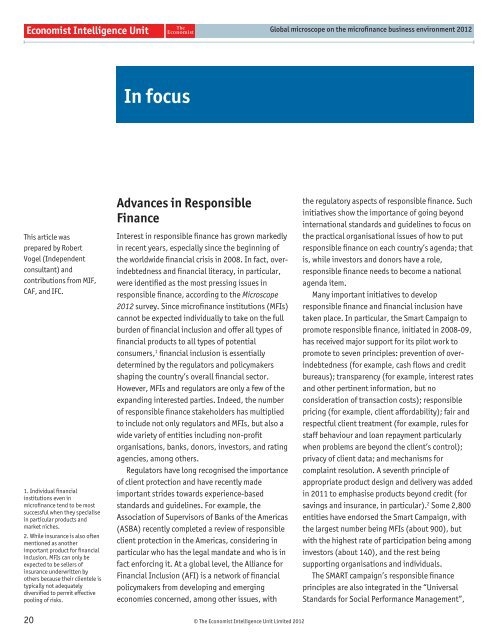
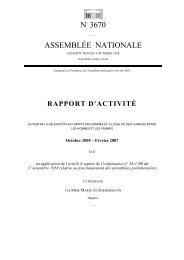
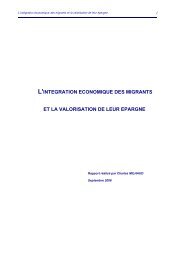
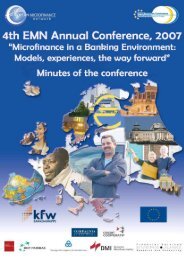
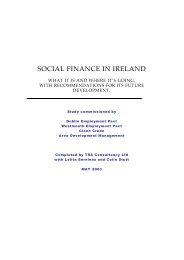

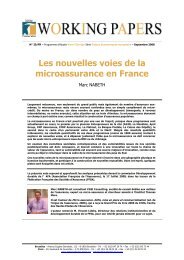
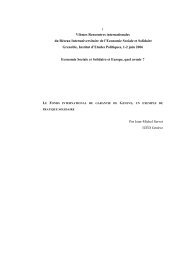

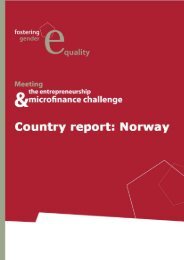
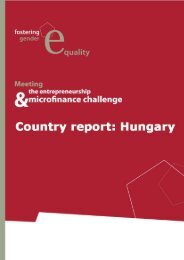
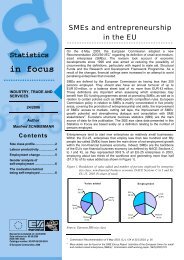
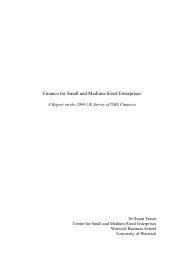
![Joint Report on Social Protection and Social Inclusion [2005]](https://img.yumpu.com/19580638/1/190x132/joint-report-on-social-protection-and-social-inclusion-2005.jpg?quality=85)
